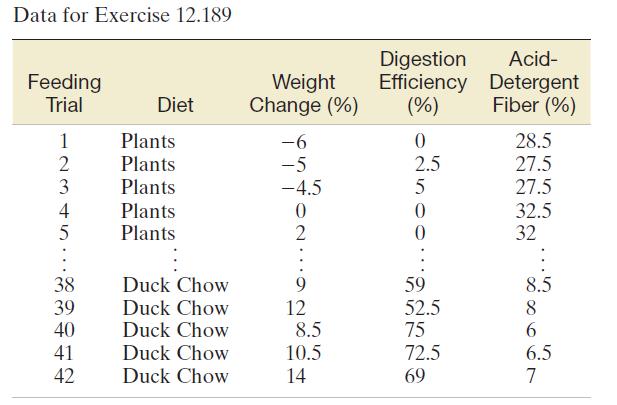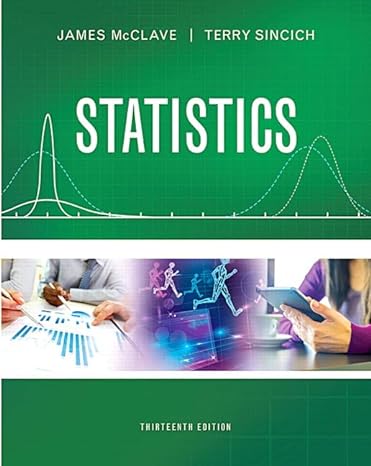Snow geese feeding trial. Refer to the Journal of Applied Ecology (Vol. 32, 1995) study of the
Question:
Snow geese feeding trial. Refer to the Journal of Applied Ecology (Vol. 32, 1995) study of the feeding habits of baby snow geese, presented in Exercise 11.150
(p. 676).
Data on gosling weight change, digestion efficiency, acid-
detergent fiber (all measured as percentages), and diet
(plants or duck chow) for 42 feeding trials are saved in the SNOW file. Selected observations are shown in the table
(p. 789). The botanists were interested in predicting weight change (y) as a function of the other variables. Consider the first-order model E1y2 = b0 + b1x1 + B2x2, where x1 is digestion efficiency and x2 is acid-detergent fiber.
a. Find the least squares prediction equation for weight change y.
b. Interpret the b@estimates in the equation you found in part a.
c. Conduct a test to determine whether digestion efficiency, x1, is a useful linear predictor of weight change.
Use a = .01.
d. Form a 99% confidence interval for b2. Interpret the result.
e. Find and interpret R2 and Ra 2 . Which statistic is the preferred measure of model fit? Explain.
f. Is the overall model statistically useful in predicting weight change? Test, using a = .05.
g. Write a first-order model relating gosling weight change (y) to digestion efficiency 1x12 and diet (plants or duck chow) that allows for different slopes for each diet.
h. Fit the model you wrote in part g to the data saved in the SNOW file. Give the least squares prediction equation.
i. Refer to part g. Find the estimated slope of the line for goslings fed a diet of plants. Interpret its value.
j. Refer to part g. Find the estimated slope of the line for goslings fed a diet of duck chow. Interpret its value.
k. Refer to part g. Conduct a test to determine whether the slopes associated with the two diets are significantly different. Use a = .05.
Step by Step Answer:

Statistics Plus New Mylab Statistics With Pearson Etext Access Card Package
ISBN: 978-0134090436
13th Edition
Authors: James Mcclave ,Terry Sincich






